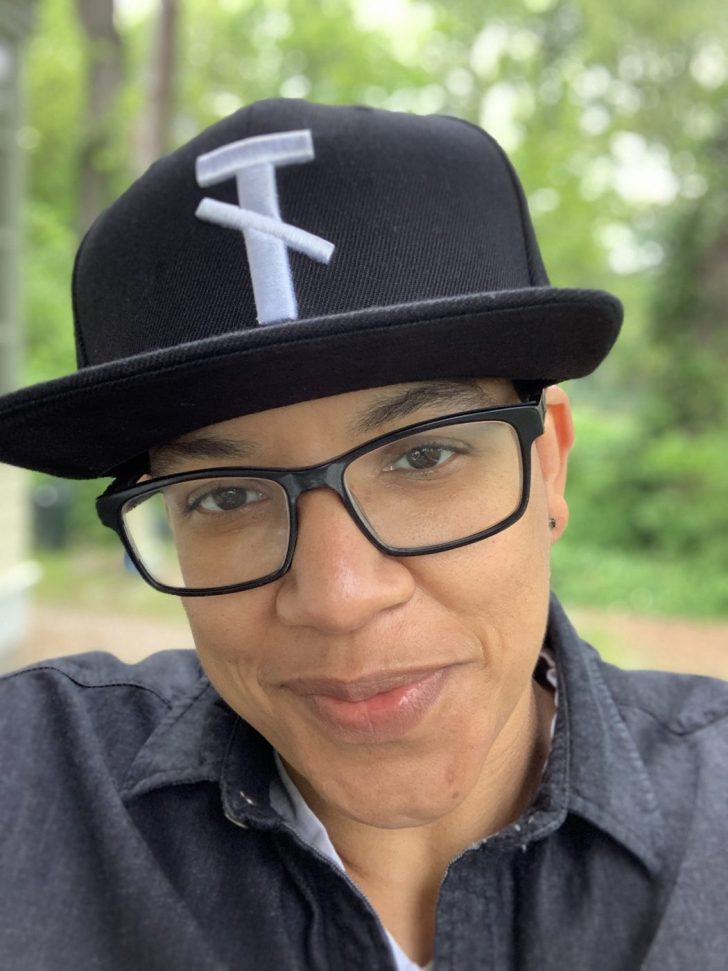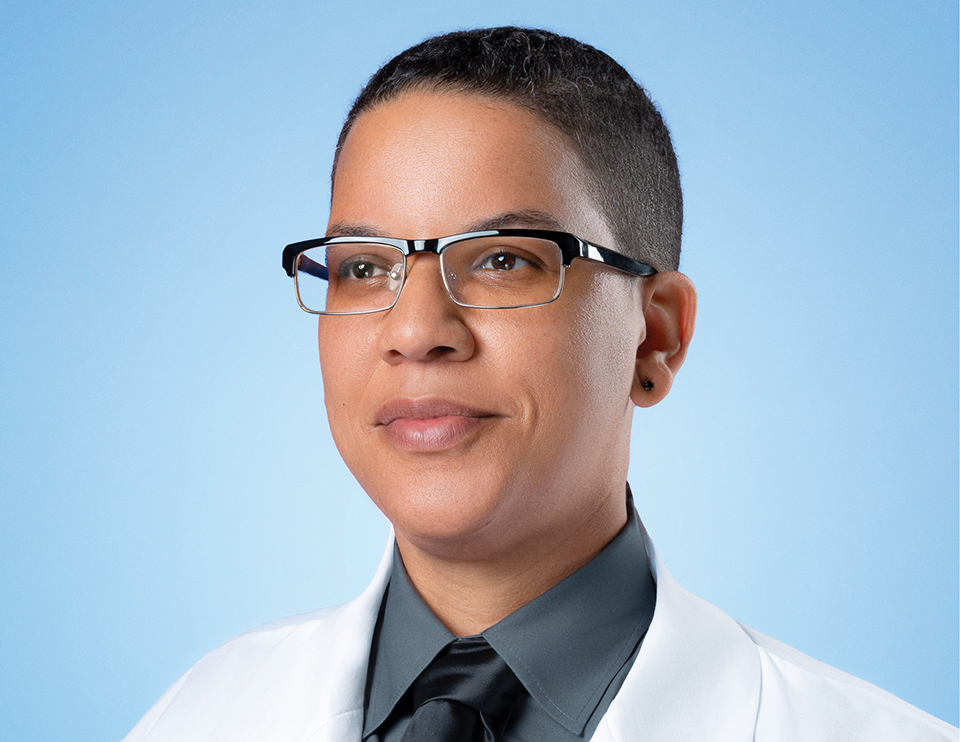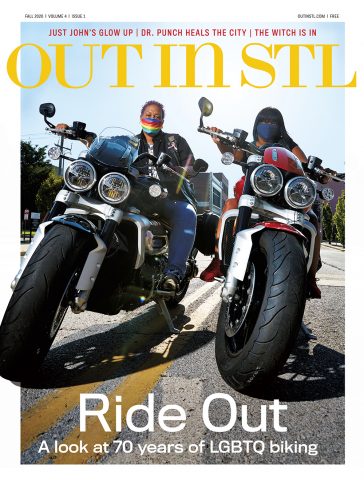It’s basically impossible to talk about public health in St. Louis right now without mentioning Dr. LJ Punch. The genderqueer genius has their hands in all the region’s most pressing issues, slicing through red tape and getting it done with brilliance, warmth, humor and grace.
After years as a trauma surgeon in Baltimore and St. Louis as well as a stint as a professor of medicine at the Institute for Public Health at Washington University in St. Louis, Dr. Punch is now focused on The T, a health education and resource center in the East Loop that they founded in January 2019.
“The T has been working with a volunteer group of health professionals to bring resources and training into the community to reduce the impact of violence,” says Punch.
The T has always provided trauma first aid training, as well as kits with materials like tourniquets. Punch’s time in trauma bays, which included delivering a lot of horrible news to a lot of mamas, made that a priority for them.
But the T takes on other pressing issues facing vulnerable populations in St. Louis, such as homelessness and opiate addiction. And of course, since spring, COVID-19 has had to become a priority.
“You can say to yourself, ‘What does a trauma surgeon have to do with public health? That’s not my expertise,’” says Punch, 45. “The truth is, violence and viruses spread very similarly.”

The doc has always had a laser-sharp focus on violence as a public health issue with deep rooted and systemic causes and has long seen harm reduction strategies as something everyone can help with. And now they’re bringing that focus and that expertise onto a wider and more holistic view for St. Louis’s most vulnerable.
The T has four main areas of focus: coronavirus protection, homelessness, opiate abuse, and violence-based trauma first aid and recovery. The factors are linked through structural and systemic disadvantages serving as transmission vectors, and as desperate problems that feed into each other.
With the right training, tools and resources, everyday people can empower themselves against all four factors. And Dr. Punch aims to provide those tools.
“It’s not a ‘pull yourself up by your bootstraps’ message,” they say. We’re talking via Zoom and the doc is masked in a room full of staff and volunteers abuzz with preparing 100,000 kits — hand sanitizer, disposable masks and other supplies for The T’s late August reopening and the months ahead after a COVID closure. “That would seem to blame you for your risk. We say you have power — we amplify that power by giving them knowledge and resources.”
The T amplifies power in many ways: Take a 90-minute class on how to help someone who is badly hurt and bleeding or buy a trauma first aid kit with tools to help you carry out what you learn. Punch and The T provide training and instruction based on Stop the Bleed, the national organization formed by the American College of Surgeons in response to the Sandy Hook shooting.
The graphics on T materials are race and gender neutral, “so we can always have everyone’s face,” says Punch. “Things can have the foundations of humanity, which have hints of masculinity and femininity which are universally engaging.”

The organization’s mission depends on paying it forward.
“We always invite people to contribute in three ways,” Punch says. “Take one of our classes, get some of our gear, commit to your own self-care. Two, after you have done that, share it with somebody else. Three, give us a resource that you have — time, money, influence.”
Punch was among the first to sound the alarm about COVID-19’s disproportionate impact on Black St. Louisans, telling local media in April that it was mostly Black people dying and that this fact was not remotely surprising.
“I went into Christian Hospital, and very early on in the pandemic it just blew me away,” they say today. “I had never seen an ICU where door after door after door had behind it a Black patient.”
To Punch, it’s all about understanding that life for Black people in St. Louis comes with a certain level of inescapable risk. And their work with The T aims to fly in the face of that — or at least keep certain outcomes from being inevitable.
“You don’t have to die because of your inescapable risk,” they say.
If you want to know Dr. Punch’s origin story (and no, the superhero allusion is not accidental), check out a TEDxGatewayArchSalon talk they did in May 2019. With slam poet cadence, they explained growing up in smalltown Ohio, “where the river is wide and the money is short,” spending $2 on piano lessons (and a snack) with Miss Elizabeth Pope Carter, a school crossing guard and gospel musician.
Miss Carter, they said, made them believe they could be great. She was defined by “radical generosity — of her time, of her talents, of herself.”
Those $2 lessons (and snacks) came with a boost in confidence that saw Punch through Yale University and medical school at the University of Connecticut. What they saw after that forged them into the powerhouse they are today.
“I’m used to working just a little too much — my point of reference is the life of a trauma center,” they say.
They’re also raising their eight-year-old son, so ‘busy’ doesn’t quite cover it. But the pandemic actually forced them to slow down a little bit, to realize that they have to keep themselves healthy in order to be of any use.
So how do Punch’s own intersecting identities as a Black queer person come into play in reaching populations with intersecting risk factors?
“I think it’s a profound access,” Punch says. “From the beginning, the work has had this guiding philosophy: If we make our experiences, our resources, everything we do accessible and safe for the most vulnerable person in the room, everyone else will adjust, everyone else will be fine,” they say.

They spoke in the TED talk about the legacy of bullets themselves, physical objects slicing through organs and families and societies. They talked about the half-inch pieces of metal creating lifetimes of suffering. They talked about deciding to find and root out bullets, instead of just fixing the holes in human flesh.
“I don’t want to see another young Black man die in a trauma center covered with too much blood, to tell his mama that he’s not coming home,” says Punch. “I’m driven because I just have seen too much. I want things to be different.”
Miles Hoffman, Street Outreach Coordinator with MO Network, is pretty much an unabashed Punch fan — we can stipulate to that right off.
“Punch is just cool,” he says.
He met them last year while taking a Stop the Bleed training to help with situations he encounters doing outreach work with people who use drugs. The two got to know each other and their respective missions, and it became clear the pair had similar goals. Nowadays, Punch accompanies Hoffman on his trips into addiction hotspots in and around the city once a week.
“So many of the things that Punch offers, and that The T offers, are intersectional to drug use and trauma that comes from homelessness and violence and gunshot wounds and the criminalization of poverty,” says Hoffman.
Punch, Hoffman says, has incredible perception for meeting people where they are, for seeing what their needs are and responding. And Punch’s multiplicity of identities is definitely an asset.
“That’s where the intersection of being queer comes in,” Hoffman says. “As queer people, we are often forgot about. While there’s not much that comes into play with day-to-day identity work, I think it definitely drives the mission behind it.”
He says that Punch has an innate ability to know where to be and how to respond — sending eye wash kits to Minneapolis when protesting began for George Floyd, for instance, and providing training and materials to street medics in Florissant.

The charismatic Punch, says Hoffman, tends to own whatever space they’re in. When they took the stage at the Florissant training, the eruption of applause was fit for a celebrity. But Punch is also a keen and close listener, creatively intuiting and finding ways to meet peoples’ very real needs.
Hoffman describes the simple dignity Punch was able to afford unhoused people on a recent mission with a boring little piece of metal: nail clippers.
“That isn’t something you think about, but people need to clip their nails,” he says.
Cathy ‘Mama Cat’ Daniels is the founder of PotBangerz, a nonprofit dedicated to feeding the unhoused, as well as helping them find their way to permanent housing — and advocating as long and loud as possible.
Daniels first heard about Punch in the context of Stop the Bleed.
“I had heard about this Dr. Punch and what an amazing human they are, and I’m like, ‘I need to meet this person,” Daniels says. “We have a lot of violence that’s in our underserved communities, and we can attribute that to poverty.”
So she reached out to Punch and invited them to PotBangerz’s annual block party focused on unhoused people, and Punch came through with resources and knowledge to share at the party.
“That’s what I think is so dope about them — they let St. Louis know, ‘I am here and I am here to help, whatever that looks like,’” Daniels says. “You get to know Dr. Punch, that’s who they are.”
Daniels says Punch’s versatility is an amazing asset. She watched them pivot fast in response to the virus and figures they’ve saved plenty of lives that way. Punch leapt at the chance to help PotBangerz set up services for a recently acquired house providing transitional housing for cisgender, queer and transgender women.
“When I think about Dr. Punch, it’s all about love, for real,” says Daniels. “Dr. Punch understands, as a Black person, how race plays into this whole thing. Knowing who they are, the good works are not really a surprise. You know who you’re dealing with. It makes sense — that’s just how Dr. Punch rocks.”



